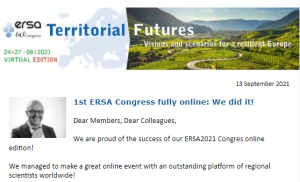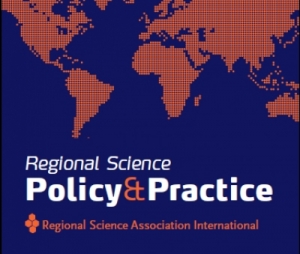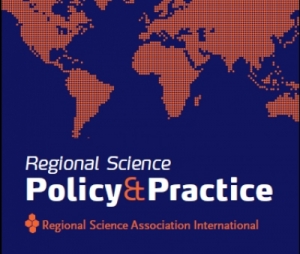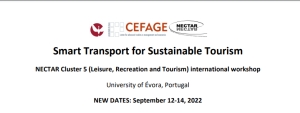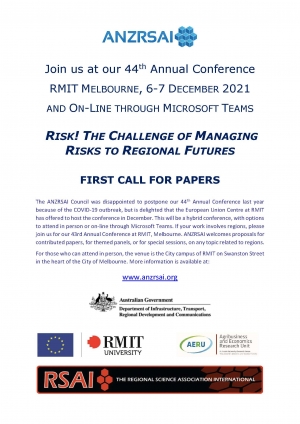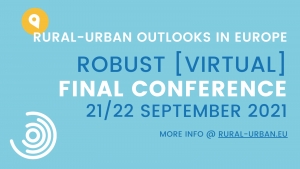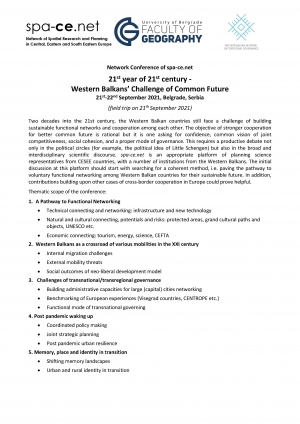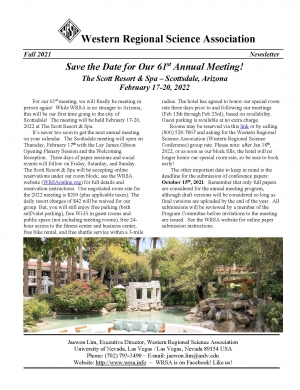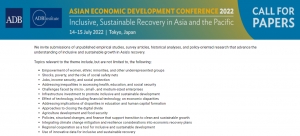Awards
Elisabete Martins
ERSA Congress 2021 - Post-Event Review
|
RSPP Call for Papers | Special Issue on Pandemics, Location and Mobility
Regional Science Policy & Practice (RSPP)
Call for Papers for a Special Issue on:
Pandemics, Location and Mobility
Submission of Titles and Abstracts to: Louafi Bouzouina, This email address is being protected from spambots. You need JavaScript enabled to view it., before September 30, 2021, with feedback before October 7, 2021.
Submission of complete papers to: https://rsaiconnect.onlinelibrary.wiley.com/journal/17577802, for the Special Issue on: Pandemics, Location and Mobility until December 31, 2021, with foreseen publication of accepted papers online in 2022, and the special issue compiled before December 2022. Contact for details This email address is being protected from spambots. You need JavaScript enabled to view it..
Motivation and features
The COVID-19 pandemic has had an unprecedented impact on human activities around the world. Mobility, the vehicle of social interaction par excellence, was the first sector to be affected, given its close and critical link with the spread of the pandemic. The consequences for mobility and the subsequent limitations of the range of movements continue today at variable spatial scales, according to the progress on vaccination programs and the health indicators/dashboard of the moment. Clearly, the links are complex and the causalities are at this stage difficult to establish.
This structural pattern has had an impact on mobility practices at international, regional and local levels, changing the volume, geography and modes of travel used. International travel has fallen drastically. Public transport has been penalized in relation to individual modes, especially the car, although walking and cycling are increasing in some cities, also benefiting from new urban planning policies (tactical urbanism measures). The COVID-19 pandemic also seems to be having an impact on the long-run location of households and businesses, which is likely to change urban forms.
The consideration of accessibility for mobility in times of pandemic and the return to the prominence of concepts such as the "quarter-hour city" is probably not inconsistent with the hypothesis of a rising popularity of peri-urbanization. Periods of containment have been conducive to a renewed interest in single-family homes and the attractiveness of out-of-city areas. The development of digital technology and the possibility of working from home, although they create social divide, are facilitating factors. Large-scale experimentation with telecommuting has led some companies to review their real estate and location strategies with a view to reducing office costs.
This Special issue of RSPP welcomes contributions that address all aspects of pandemic-related effects on location and mobility, including:
- The role of mobility on the spread of COVID-19 pandemic
- The impact of the COVID-19 pandemic on mobility behavior
- COVID-19 pandemic and household location choices
- COVID-19 pandemic and firm location strategies
- The impact of teleworking on long-term travel behavior & location choice
- The impact of E-commerce on shopping trips & logistics organization
- Location, mobility and digital divide
- Land use and transport policies during the COVID-19 pandemic
- Pandemics and resilient cities & regions
- Social interaction and the ‘new mobility’
- Urban planning and policy in a post-pandemic world
The RSPP Guest Editor for the Special Issue on: Pandemics, Location and Mobility is:
Louafi BOUZOUINA
University of Lyon, France
This email address is being protected from spambots. You need JavaScript enabled to view it.
Visiting professor, Open University, The Netherlands
Addendum
Authors whose Abstracts have been preselected for the Special Issue of RSPP will be invited for presentation of their draft paper at a workshop in Ponta Delgado in the Azores on November 1-2, 2021, with a financial support for a few days accommodation.
RSPP Call for Papers | Special Issue on Emerging Technologies and Regional Development
RSPP Call for Papers for a Special Issue on Emerging Technologies and Regional Development
Following the 17th PRSCO Summer Institute conference, we invite submission of the papers to https://rsaiconnect.onlinelibrary.wiley.com/journal/17577802 for the Special Issue on Emerging Technologies and Regional Development. We welcome both papers presented and not presented at the conference for this issue. The submission deadline is January 31, 2022 and the special issue is expected to be published in late 2022. Please contact This email address is being protected from spambots. You need JavaScript enabled to view it. if you need more information.
Motivation
Technology has been changing the business landscape, challenging status quo, yet, creating opportunities to business leaders for innovative ways of thinking and potential growth. Financial Technology – FinTech – refers to technological innovations in the areas of banking and finance, facilitating the interactions among market participants and promoting the efficiency of transactions. Until now, many applications of FinTech have been widely available to users around the world. At the same time, blockchain and distributed ledger technology have risen to one of the hottest topics in regional development as several blockchain solutions have been adopted in various sectors such as public, financial, business, technology and education. In addition, new technologies create more opportunities for less developed countries to make significant leaps that will put them on par with more developed countries.
According to Czvetkó, Honti and Abonyi (2021), the five main dimensions of regional development in this new high-tech era include higher education and lifelong learning, labour market, technological readiness, innovation and investment that are interrelated to the Triple Helix actors including academic, industry and the government. All these dimensions aim to strengthen the competitiveness and development of a region.
From the higher education and lifelong learning perspective, a new market demand has been created whereby the industry requires a more skilled workforce with new skillsets due to digital transformation and innovation. For the labour market, the transition to a more technology-driven economy has both created new jobs and displaced many other jobs. However, the pressure is there for governments and institutions whereby new skill development models are required to ensure job opportunities. Investment and innovation are tightly linked to each other since financial incentives play an important role in innovation. However, the innovation and equipment of businesses might not be sufficient to determine the level of technological readiness in a region and a high degree of flexibility is required to form a basis for digital culture and skills.
This Special Issue of RSPP welcomes contributions that address all aspects of emerging technologies and regional development, including but not limited to:
- Blockchain solutions in regional development
- Big Data in regional development
- FinTech and its impact on regional development
- FinTech/Blockchain regulatory framework
- Industry 4.0 and regional development
The RSPP Guest Editors for the Special Issue on Emerging Technologies and Regional Development:
Professor Budy Resosudarmo, Australian National University, Australia
Professor Rachel Franklin, Newcastle University, the U.K.
Professor Soushi Suzuki, Hokkai-Gakuen University, Japan
Associate Professor Thai Nguyen, RMIT University, Vietnam
Associate Professor Vikash Ramiah, University of Wollongong, UAE
Call for Papers | NECTAR CL 5 international workshop on "Smart Transport for Sustainable Tourism", September 12-14, 2022
Please find attached the call for papers from NECTAR Cluster 5 (Leisure, Recreation and Tourism) for an international workshop on "Smart Transport for Sustainable Tourism". This meeting will be held in Évora (Portugal) during September 12-14, 2022.
The deadline for submission of abstracts is July 15, 2022.
More information can be found in the attached call.
CALL FOR PAPERS | 44th ANZRSAI Conference | 6-7 December 2021, RMIT MELBOURNE and ON-LINE
The 44th annual conference of ANZRSAI will be hosted by the European Union Centre at RMIT University.
The venue is the RMIT City Campus in Melbourne.
The dates are 6-7 December 2021.
The ANZRSAI Council was disappointed to postpone our 44th Annual Conference last yearThe ANZRSAI Council was disappointed to postpone our 44th Annual Conference last yearbecause of the COVID-19 outbreak, but is delighted that the European Union Centre at RMIThas offered to host the conference in December. This will be a hybrid conference, with optionsto attend in person or on-line through Microsoft Teams. If your work involves regions, pleasejoin us for our 43rd Annual Conference at RMIT, Melbourne. ANZRSAI welcomes proposals forcontributed papers, for themed panels, or for special sessions, on any topic related to regions.For those who can attend in person, the venue is the City campus of RMIT on Swanston Streetin the heart of the City of Melbourne. More information is available at: www.anzrsai.org
The First Call for Papers is available here.
Further information about the conference is available here.
ROBUST Final Conference, Rural-Urban Outlooks in Europe, 21-22 Sep 2021 (Online)
ROBUST Final Conference
Tue 21 Sep 2021 to Wed 22 Sep 2021
Online (Zoom)
The ROBUST project will hold its Final Conference online, wrapping up the project’s activities and presenting its key findings, takeaways and outlooks on the future of rural-urban governance.
Over the course of the two-day program, speakers will take a closer look at the successes and challenges of the ROBUST Living Lab model, presenting valuable lessons that can be taken forward in the future. Panel sessions will also focus on the mounting evidence in support of shifting to a well-being economy, and how this shift can strengthen the relationships between rural and urban areas.
More information at: https://rural-urban.eu/events/robust-final-conference
Network Conference of Spa-ce.net - 21st year of 21st century, titled Western Balkans’ Challenge of Common Future, 21-22 September 2021, Belgrade, Serbia
The Network of Spatial Research and Planning in Central, Eastern and South Eastern Europe, is organizing the Network Conference of Spa-ce.net - 21st year of 21st century, titled Western Balkans’ Challenge of Common Future, taking place from 21st-22nd September 2021, Belgrade, Serbia.
More information is available at: http://www.spa-ce.net/pdf/2021/Spa-ce-net-Call-for-Papers-2021.pdf. The preliminary programme of the Conference is attached.
WRSA: Fall 2021 Newsletter + 2022 Annual Meeting in Scottsdale, AZ (near Phoenix)
The Fall 2021 Newsletter is attached and contains everything you'll need to start planning our 61st Annual Meeting in Scottsdale, AZ (near Phoenix). For those wanting the information now, here are the key details:
Paper Submission: Papers should be submitted to the WRSA website by October 15, although as in past years the "deadline" will be extended until the end of November. Only full papers (draft format acceptable) will be accepted. The program review committee will review and invitations will be sent to the accepted papers. Draft papers are sufficient for the October deadline, so long as we have a complete version in hand by the end of January 2022.
Hotel Reservations: Our negotiated room rate at the Hilton is $209/night (plus applicable taxes). Full details and a reservation link are posted on our website (link here). The daily resort charge of $42 will be waived for our group. But, you will still enjoy free parking (both self/valet parking), free Wi-Fi in guest rooms and public space (not including meeting rooms), free 24-hour access to the fitness center and business center, free bike rental, and free shuttle service within a 3-mile radius. The hotel has agreed to honor our special room rate four days prior to and three days following our meeting (Feb 13th through Feb 23th), based on availability. Please note: after January 18, 2022, the hotel will no longer honor our special room rate! Be sure to book early!
Tiebout Prize: Advisors and Ph.D. students alike are reminded that October 15 is the hard deadline for submissions for the 36th Annual Tiebout Prize in Regional Science. Visit the WRSA website for full details about Tiebout Prize. Papers co-authored with faculty advisors are acceptable, however, the primary author must meet the Tiebout student requirements and the bulk of the substantive work and contribution of the paper must have come from the student. REQUIRED: Submitted pdfs of the paper must include a letter from the faculty advisor confirming that these requirements have been met.
Student Conference Assistants: WRSA is seeking several students to assist with meeting registration in Pasadena. In exchange for 8-10 hours of volunteering at the registration desk, students will receive a complete rebate of their preregistration fees (worth $150, to be processed as a refund following the meeting) and potentially discounted staff rooms at the conference hotel. Contact me via This email address is being protected from spambots. You need JavaScript enabled to view it. if you're interested.
Session Chairs and Paper Discussants: Planning to come to Hawaii and won’t be presenting a paper? We are always VERY happy to assign you to session chair or paper discussant duties if you’re willing. Just drop us an email (This email address is being protected from spambots. You need JavaScript enabled to view it.) to let us know your preferences and availability constraints.
Call for Papers: Asian Economic Development Conference, 14-15 July 2022

The Asian Development Bank and the Asian Development Bank Institute will hold the inaugural Asian Economic Development Conference on 14–15 July 2022 in Tokyo. The objective of the conference is to promote the discussion of high-quality, frontline research on Asian development among social scientists, development practitioners, and policy makers.
The fallout from the COVID-19 pandemic threatens to undermine the decades of progress the region has made in raising living standards and eliminating poverty. The theme of the conference, “Inclusive, Sustainable Recovery in Asia and the Pacific,” will showcase cutting-edge research that explores how the efforts to rebuild after the crisis can also be opportunities to make development more inclusive and help achieve climate goals. Keynote speakers include Rema Hanna (Harvard University), Xin Meng (Australian National University), and Yasuyuki Sawada (University of Tokyo).
We invite submissions of unpublished empirical studies, survey articles, historical analyses, and policy-oriented research that advance the understanding of inclusive and sustainable growth in Asia’s recovery. Topics relevant to the theme include, but are not limited to, the following:
• Empowerment of women, ethnic minorities, and other underrepresented groups
• Shocks, poverty, and the role of social safety nets
• Jobs, income security, and social protection
• Addressing inequalities in accessing health, education, and social security
• Challenges faced by micro-, small-, and medium-sized enterprises
• Infrastructure investment to promote inclusive and sustainable development
• Effect of technology, including financial technology, on economic disparities
• Addressing implications of disparities in education and human capital formation
• Approaches to closing the digital divide
• Agriculture development and food security
• Policies, structural changes, and finance that support transition to clean and sustainable growth
• Integrating climate change mitigation and resilience considerations into economic recovery plans
• Regional cooperation as a tool for inclusive and sustainable development
• Use of innovative data for inclusive and sustainable recovery Interested authors must register and submit a paper by 14 January 2022 here. The paper should include authors’ affiliations and contact information.
Submissions will be evaluated in terms of originality, analytical rigor, and policy relevance in the Asian context. Authors of accepted papers will be contacted by 15 March 2022.
Authors of accepted papers will also have the opportunity to submit their papers for a Special Issue of the Asian Development Review (Guest Editor: Xin Meng, Australian National University).
KEY DATES
Paper submission deadline: 14 January 2022
Decision notifications: 15 March 2022
Registration period: March–April 2022
Draft program: May 2022
Conference: 14–15 July 2022
ADVISORY BOARD
Asian Development Bank
Joseph E. Zveglich, Jr.
Shu Tian
Gemma Estrada
Asian Development Bank Institute
Tetsushi Sonobe
Peter Morgan
Daniel Suryadarma
Position Opening - Senior Lecturer - Department of Social Sciences, Illinois Institute of Technology, Chicago
Title: Senior Lecturer – Department of Social Sciences, Illinois Institute of Technology, Chicago
Introduction: Founded in 1890, Illinois Institute of Technology was born different. It was built on the promise set forth in minister Frank Wakely Gunsaulus’ “Million Dollar Sermon” to provide access to higher education for students from all different backgrounds and to make a difference in the world through technology-oriented education. This guiding mission and purpose—where students, including those underrepresented in technology, could prepare for meaningful roles in a changing industrial society and achieve professional and economic advancement—remains just as relevant today. Thus, diversity and inclusion are part of the day-to-day experience at Illinois Institute of Technology and the centerpiece of its culture. Because of this, Illinois Institute of Technology is home to a diverse and global student population, and is committed to providing opportunities to enhance the diversity of its faculty and staff. To this end, Illinois Institute of Technology strongly encourages applicants from all backgrounds to apply for this position, especially those underrepresented in the field, including, but not limited to, African Americans, Latinx, Indigenous peoples and others.
Position Description: The Illinois Institute of Technology seeks an individual for a full-time, 9-month position as a Senior Lecturer in the Department of Social Sciences (https://www.iit.edu/social-sciences). Appointment periods are 3-5 years and renewable. The preferred start date is January 3, 2022.
We seek candidates to teach a broad range of social science courses and to potentially develop inter/crossdisciplinary programs with the engineering and science departments. The successful applicant is expected to be a dynamic and engaging lecturer and demonstrate potential for overall excellence in teaching.
Candidates are expected to demonstrate best teaching practices. Lecturers in the department teach three courses per semester in the fall and spring terms, become members of some service committees, mentor and advise undergraduates and help with recruitment activities. Opportunities for summer teaching employment and potential administrative duties may also be available for well qualified candidates. Annual salary is negotiable and dependent upon the candidate’s previous experience and qualifications.
Qualifications
- A Ph.D. or foreign equivalent in political science, sociology, geography, public policy, applied economics, urban planning or a closely related field
- Previous teaching experience is desirable but not required
Instructions
- Please submit the following application materials by mail to: Prof. Jeff Terry, Interim Department Chair, Illinois Institute of Technology, 3101 S. Dearborn St., Chicago, IL 60616 or by email to This email address is being protected from spambots. You need JavaScript enabled to view it. and provide names/contact information for three references who will be prepared to submit letters of recommendation upon request.The application should include:
- Cover letter addressing the candidate’s qualifications
- Curriculum vitae
- Statement of teaching philosophy and interests including any available evidence of teaching excellence. If applicable, please include any experience in teaching, mentoring or engaging in research with a diverse population of students.
Review of applications will begin upon receipt and the position will remain open until filled. Complete applications received by October 1, 2021 will receive priority consideration. If you have a question about the details of this search or position, please contact the Interim Chair, Prof. Jeff Terry at This email address is being protected from spambots. You need JavaScript enabled to view it..
The Illinois Institute of Technology is an EEO/AA/Title VI/Title IX/Section 504/ADA/ADEA employer; we are committed to enhancing equity, inclusion and diversity within our community. Illinois Tech seeks applications from all individuals regardless of race, color, sex, marital status, religion, creed, national origin, disability, age, military or veteran status, sexual orientation, and/or gender identity and expression. All qualified applicants will receive equal consideration.
About Us
The Regional Science Association International (RSAI), founded in 1954, is an international community of scholars interested in the regional impacts of national or global processes of economic and social change.

